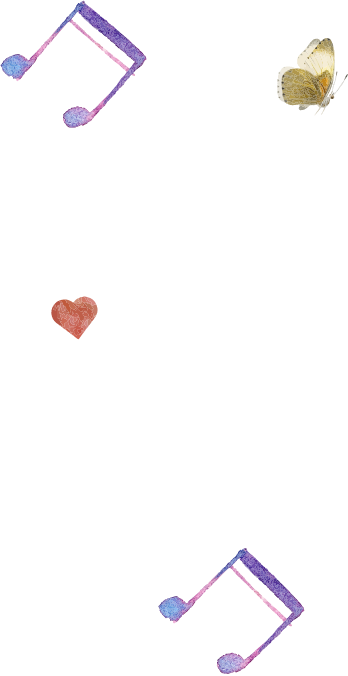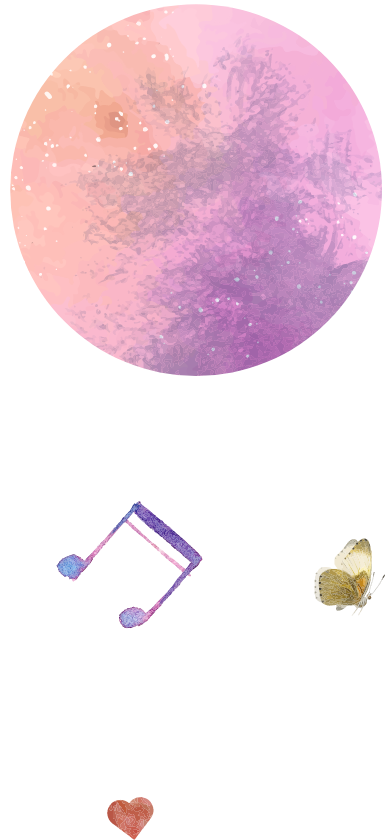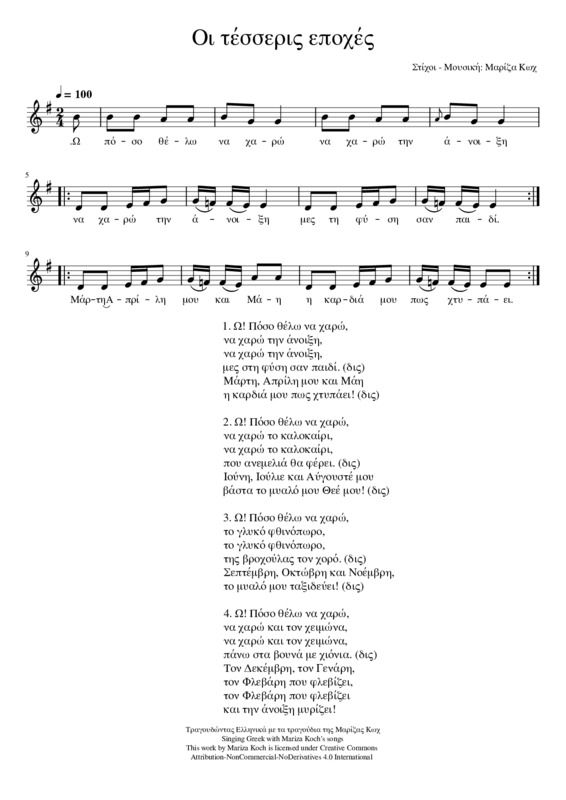
Oi tesseris epoches

Oi tesseris epoches
Pronunciation
Articulation of the phoneme /χ/ (/ch/).
Find Greek words beginning with or containing the phoneme /ch/ and practice its use [χαρά (chara, happiness), χαίρομαι (chairomai, I am glad), χάρτης (chartēs, map) etc.].
Differentiation of the articulation of the phoneme /ch/ according to the vowel which follows, i.e. χέρι (cheri, arm), χελιδόνι (chelidoni, swallow), χαρώ (charō, that I am glad), χτυπάει (chtypaei, he/she/it pounds on something), χειμώνα (cheimōna, winter), χορό (choro, dance), χιόνια (chionia, snow).
Practice other phonemes: /ξ/ (/x/) [άνοιξη (anoixē, spring), ταξιδεύει (taxideuei, he/she/it travels)], and clusters: /φθ/ (/phth/) [φθινόπωρο (phthinopōro, fall)] , /κτ/ (kt) [Οκτώβρης (Oktōvrēs, October)], /μβρ/ (/mvr/) [Σεπτέμβρης (Septemvrēs, Septembrer), Νοέμβρης (Noemvrēs, November), Δεκέμβρης (Dekemvrēs, December)].
Find Greek words beginning with or containing the phoneme /ch/ and practice its use [χαρά (chara, happiness), χαίρομαι (chairomai, I am glad), χάρτης (chartēs, map) etc.].
Differentiation of the articulation of the phoneme /ch/ according to the vowel which follows, i.e. χέρι (cheri, arm), χελιδόνι (chelidoni, swallow), χαρώ (charō, that I am glad), χτυπάει (chtypaei, he/she/it pounds on something), χειμώνα (cheimōna, winter), χορό (choro, dance), χιόνια (chionia, snow).
Practice other phonemes: /ξ/ (/x/) [άνοιξη (anoixē, spring), ταξιδεύει (taxideuei, he/she/it travels)], and clusters: /φθ/ (/phth/) [φθινόπωρο (phthinopōro, fall)] , /κτ/ (kt) [Οκτώβρης (Oktōvrēs, October)], /μβρ/ (/mvr/) [Σεπτέμβρης (Septemvrēs, Septembrer), Νοέμβρης (Noemvrēs, November), Δεκέμβρης (Dekemvrēs, December)].
Speech Comprehension and Production
Seasons of the year: spring, summer, fall, winter and the months of each season.
Description of nature during each time of the year, characteristic activities of people.
The pupils identify the feelings caused by each season according to the lyrics of the song. They then choose one season of the year, divided into groups based on the season they have chosen (four groups), share with the group their own feelings about it, and they produce a poetic or prose text for each season.
Subjunctive mood: να χαρώ (na charō, that I be glad/happy). Create phrases beginning with "πόσο θέλω να...." (poso thelō na..., how much I want to...).
Familiarize with the two morphological types of months: Σεπτέμβρης - Σεπτέμβριος (Septemvrēs - Septemvrios, September), Οκτώβρης - Οκτώβριος (Oktōvrēs - Oktōvrios, October), etc.
Search and find the names of the months in folk tradition [Φεβρουάριος - Κουτσοφλέβαρος (Fevrouarios - Koutsophlevaros, February - nickname indicating it has fewer days than the other months), Μάρτης - Κλαδευτής (Martēs - Kladeutēs, March - nickname indicating the activity of cropping), Ιούλιος - Θεριστής ή Αλωνάρης (Ioulios - Theristēs or Alōnarēs, July - nicknames indicating the activity of harvesting), Σεπτέμβριος - Τρυγητής (Septemvrios - Trygētēs, September - nickname indicating the activity of picking grapes), Οκτώβριος - Σποράς ή Βροχάρης (Oktōvrios - Sporas or Vrocharēs, October - nicknames indicating the activity of sowing and the first rainfalls respectively) etc.]
Description of nature during each time of the year, characteristic activities of people.
The pupils identify the feelings caused by each season according to the lyrics of the song. They then choose one season of the year, divided into groups based on the season they have chosen (four groups), share with the group their own feelings about it, and they produce a poetic or prose text for each season.
Subjunctive mood: να χαρώ (na charō, that I be glad/happy). Create phrases beginning with "πόσο θέλω να...." (poso thelō na..., how much I want to...).
Familiarize with the two morphological types of months: Σεπτέμβρης - Σεπτέμβριος (Septemvrēs - Septemvrios, September), Οκτώβρης - Οκτώβριος (Oktōvrēs - Oktōvrios, October), etc.
Search and find the names of the months in folk tradition [Φεβρουάριος - Κουτσοφλέβαρος (Fevrouarios - Koutsophlevaros, February - nickname indicating it has fewer days than the other months), Μάρτης - Κλαδευτής (Martēs - Kladeutēs, March - nickname indicating the activity of cropping), Ιούλιος - Θεριστής ή Αλωνάρης (Ioulios - Theristēs or Alōnarēs, July - nicknames indicating the activity of harvesting), Σεπτέμβριος - Τρυγητής (Septemvrios - Trygētēs, September - nickname indicating the activity of picking grapes), Οκτώβριος - Σποράς ή Βροχάρης (Oktōvrios - Sporas or Vrocharēs, October - nicknames indicating the activity of sowing and the first rainfalls respectively) etc.]
Music Activities
Listen and learn the song using auxiliary material (cards with months or drawings of the children describing the lyrics).
Listen to the traditional song "Ντιρλαντά" (Dirlanda) of Kalymnian sponge divers from which the melody is inspired. The pupils can freely move in space while listening to the song (Suggested video: https://www.youtube.com/watch?v=mTWHEYUWXW4).
Create sound images based on sounds of nature depending on the time of the year (work in groups).
Listen to sound clips of Antonio Vivaldi's "The four seasons" and create a graphic sheet music for each season (work in groups).
Listen to the traditional song "Ντιρλαντά" (Dirlanda) of Kalymnian sponge divers from which the melody is inspired. The pupils can freely move in space while listening to the song (Suggested video: https://www.youtube.com/watch?v=mTWHEYUWXW4).
Create sound images based on sounds of nature depending on the time of the year (work in groups).
Listen to sound clips of Antonio Vivaldi's "The four seasons" and create a graphic sheet music for each season (work in groups).
Cross-thematic Connections - Greek Culture
Interdisciplinary concepts: time, tradition.
Refer to traditional fairy tales and proverbs related to months or seasons. Narrate the fairy tale "Η κυρά-Καλή και οι δώδεκα μήνες" (hē kyra-Kalē kai oi dōdeka mēnes) and refer to the advantages and disadvantages of each month.
Phrases and proverbs related to months and tasks associated with the cultivation of cereals: "Χιόνι πέφτει το Γενάρη, χαρές θαν΄τον αλωνάρη" (Chioni pephtei to Genarē, chares than' ton alōnarē), "Ο Φλεβάρης με νερό, κουτσός μπαίνει στο χορό" (Ο Phlevarēs me nero, koutsos bainei sto choro), "Ο Μάρτης βρέχει και ο θεριστής (Ιούνιος) χαίρεται" (O Martēs vrechei kai o theristēs (Iounios) chairetai), "ο Μάης φτιάχνει τα σπαρτά κι ο Μάης τα χαλάει" (O Maēs phtiachnei ta sparta ki o Maēs ta chalaei), "το τραγούδι του θεριστή, η χαρά τ' αλωνιστή (Ιούλιος)" (to tragoudi tou theristē, hē chara t' alōnistē (Ioulios), "τον Αλωνάρη δούλευε,καλό χειμώνα να'χεις" (ton Alōnarē douleue, kalo cheimōna na' cheis), "όποιος φυλάει τον Αύγουστο, το Μάη θερίζει μόνος" (opoios phylaei ton Augousto, to Maē therizei monos), "Όκτωβρη (σπάρτης) και δεν έσπειρες, καρπό πολυ δεν παίρνεις" (Oktōvrē (spartēs) kai den espeires, karpo poly den pairneis), "ο Νοέμβριος ή Μεσοσπορίτης" (o Noemvrios ē Mesosporitēs).
Watch the video https://www.youtube.com/watch?v=mTWHEYUWXW4, which contains references to the life of Kalymnian sponge divers. According to tradition, this song was sung when the diver emerged to the surface in order to prevent the decompression sickness, as well as to give rhythm to the men steering the wheel of the pump sending air to the diver.
Refer to traditional fairy tales and proverbs related to months or seasons. Narrate the fairy tale "Η κυρά-Καλή και οι δώδεκα μήνες" (hē kyra-Kalē kai oi dōdeka mēnes) and refer to the advantages and disadvantages of each month.
Phrases and proverbs related to months and tasks associated with the cultivation of cereals: "Χιόνι πέφτει το Γενάρη, χαρές θαν΄τον αλωνάρη" (Chioni pephtei to Genarē, chares than' ton alōnarē), "Ο Φλεβάρης με νερό, κουτσός μπαίνει στο χορό" (Ο Phlevarēs me nero, koutsos bainei sto choro), "Ο Μάρτης βρέχει και ο θεριστής (Ιούνιος) χαίρεται" (O Martēs vrechei kai o theristēs (Iounios) chairetai), "ο Μάης φτιάχνει τα σπαρτά κι ο Μάης τα χαλάει" (O Maēs phtiachnei ta sparta ki o Maēs ta chalaei), "το τραγούδι του θεριστή, η χαρά τ' αλωνιστή (Ιούλιος)" (to tragoudi tou theristē, hē chara t' alōnistē (Ioulios), "τον Αλωνάρη δούλευε,καλό χειμώνα να'χεις" (ton Alōnarē douleue, kalo cheimōna na' cheis), "όποιος φυλάει τον Αύγουστο, το Μάη θερίζει μόνος" (opoios phylaei ton Augousto, to Maē therizei monos), "Όκτωβρη (σπάρτης) και δεν έσπειρες, καρπό πολυ δεν παίρνεις" (Oktōvrē (spartēs) kai den espeires, karpo poly den pairneis), "ο Νοέμβριος ή Μεσοσπορίτης" (o Noemvrios ē Mesosporitēs).
Watch the video https://www.youtube.com/watch?v=mTWHEYUWXW4, which contains references to the life of Kalymnian sponge divers. According to tradition, this song was sung when the diver emerged to the surface in order to prevent the decompression sickness, as well as to give rhythm to the men steering the wheel of the pump sending air to the diver.
Age level
7-11 years old
Language level
Beginner
Intermediate
Seasons
Ta tragoudia pane theatro




